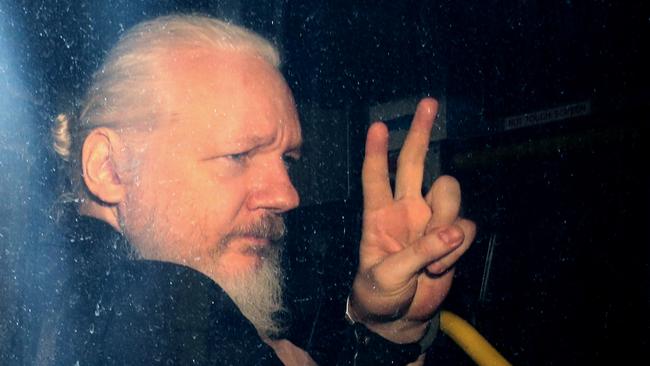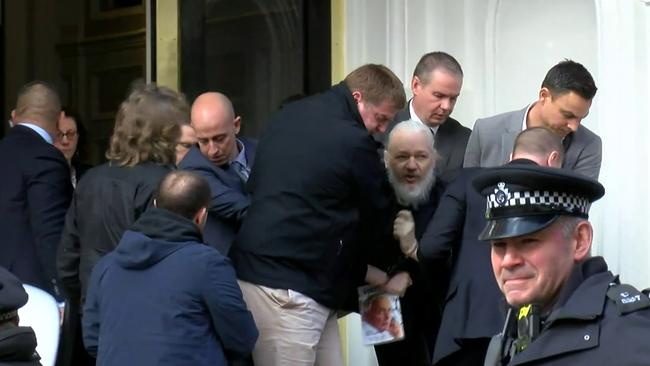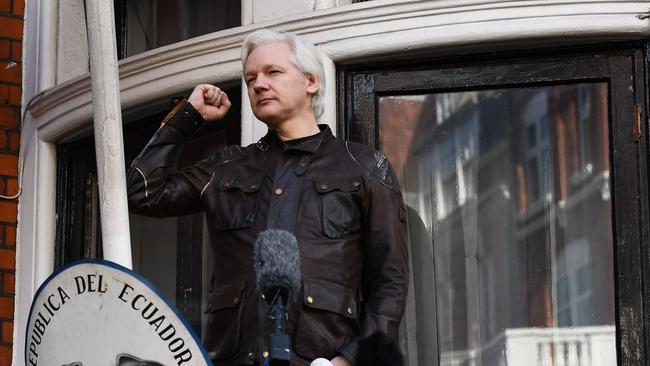Julian Assange arrested, found guilty
PM says Julian Assange will get “no special treatment” as he faces 12 months jail in London.

The Australian government will make no special representations for WikiLeaks founder Julian Assange after his arrest last night, says Scott Morrison.
The Wikileaks founder was found guilty of absconding from bail relating to a British charge that began in 2010 and will be sentenced in Southwark Crown Court where he faces up to 12 months in jail.
Minutes after his arrest the US filed an extradition request and he will return to Westminster Magistrates Court on May 2 for the start of at the extradition hearing.
Mr Assange sent a message from his jail cell thanking people for all of their support but insisting “I told you so’’.
Mr Morrison told reporters this morning: “He will get the consular assistance as you would expect him to but he will have to make his way through whatever has come his way in terms of the justice system there,” the Prime Minister said.
“He won’t be getting special treatment from Australia. He will be getting the same treatment that any other Australian would get in circumstances.”
Mr Morrison said Foreign Minister Marise Payne last night spoke to Australia’s High Commissioner to Britain, George Brandis, about the issue.
Ecuador arrest
Meanwhile, Ecuador’s interior minister says a person suspected of being a key player for Wikileaks and close to Julian Assange has been detained at Quito’s airport trying to fly to Japan.
Maria Paula Romo says the person arrested allegedly conspired against the Ecuadorian government.
The Ecuadorian official said the arrest Thursday afternoon was the result of an investigation to verify information given by police.
She did not identify the person.
Dragged out of embassy
Earlier, Mr Assange attended the hastily arranged court hearing at Westminster Magistrates Court just hours after being dramatically arrested inside the Ecuadorian embassy in central London — where he had been living for nearly seven years — after President Lenin Moreno rescinded the Australian’s political asylum.
During some of the court proceedings he read a Gore Vidal book, titled History of the Security State.
Judge Michael Snow said in finding Mr Assange guilty of breaching bail conditions, that his behaviour was “the behaviour of a narcissist who cannot get beyond his own selfish interest”.
He will next appear at the Southwark Crown Court at a date to be fixed in relation to the sentencing on his bail conviction.
Mr Assange’s lawyer Jen Robinson said: “Julian Assange wants to thank everyone for their ongoing support but he said ‘I told you so’”, reflecting the immediate extradition request filed by the United States within minutes of him being taken out of the Ecuador Embassy on Thursday morning.
Ms Robinson said on the steps of Westminster Court — where she struggled to make herself heard given the loud protesters shouting “free, free, free’’ — that Mr Assange’s arrest set a dangerous precedent for media organisations.
“Any journalists writing about the United States can be extradited for publishing truthful information about the United States,’’ she said.
World reacts
Ecuador President Lenin Moreno lashed out again at Mr Assange, calling him a “miserable hacker” and “spoiled brat” who was aggressive to the officials caring for him at the embassy. Mr Moreno repeated allegations that Mr Assange smeared his own fecal matter on the walls of the embassy building and said it was a sign of how the WikiLeaks founder viewed Ecuador.
As Sweden reportedly said it would look at reopening the charges of sexual abuse against Mr Assange that first saw him seek asylum, Donald Trump, a former outspoken supporter of WikiLeaks, distanced himself from the website.
When asked about Mr Assange’s arrest in London, the president said: “It’s not my thing. I know there is something having to do with Julian Assange. I’ve been seeing what’s happened with Assange and that will be a determination, I would imagine, mostly by the Attorney-General. So, he’lI be making a determination. I know nothing really about him. It’s not my deal in life.”
Hillary Clinton said Assange needs to “answer for what he has done.”
British Prime Minister Theresa May told parliament “no-one is above the law”.
Assange’s friend, US actress Pamela Anderson said: “How could you Equador (sic)? (Because he exposed you). How could you UK? Of course — you are America’s b***h and you need a diversion from your idiotic Brexit bullsh*t.”
Slew of charges
A WikiLeaks spokesman also warned that the initial charge laid by the United States, of conspiring with Chelsea Manning in 2010 — was only the first of what could be a slew of charges. He feared once the United States had Mr Assange on US soil that they would add to the charges.
Ms Robinson said that the immediate priority was securing medical assistance for Mr Assange while he was in detention, something she said that had been denied him while he was in the embassy.
Mr Assange’s bail breach occurred when had exhausted his legal appeals against an extradition to Sweden and sought refuge in the Ecuador Embassy in December 2012.
Mr Assange’s legal team also indicated they would be filing defence motions in relation to the extradition request from the United States.
The court heard that arrest of Mr Assange did not go as smoothly as might have been expected. When police officers arrived inside the Ecuador embassy around 9.15am local time and began to introduce themselves, Mr Assange barged past them into his private room on the ground floor shouting “this is unlawful, I am not leaving’’.
It wasn’t until shortly after 10am that he was handcuffed with assistance from extra officers who were outside and called upon for help.
Once handcuffed, Assange, with a long beard, was marched out of the Knightsbridge flat by four undercover Scotland Yard detectives and several uniformed police.
He held a picture in his hands and yelled what seemed to be “the UK has no respect for freedom’’ as he was bundled into a police van.
WikiLeaks said the Ecuadorian ambassador had invited British police inside, where Mr Assange was immediately arrested.
It said Ecuador had illegally terminated Assange’s political asylum in violation of international law. However, a country can rescind its diplomatic status and allow “foreign’’ authorities inside diplomatic compounds to make an arrest.

BREAK: Full @Ruptly video of WikiLeaks founder Julian Assange’s arrest by British police this morning pic.twitter.com/tdBw1Kbpxn
— Barnaby Nerberka (@barnabynerberka) April 11, 2019
The 47-year-old had been holed up inside the embassy since June 2012, amid fears he would be extradited to the US and tried for treason after WikiLeaks published thousands of classified military and diplomatic cables.
The US wasted no time issuing an extradition request for Mr Assange last night. In a statement the Metropolitan Police said Mr Assange has been further arrested on behalf of the US authorities, at 10.53am after his arrival at a central London police station.
The US announced late last night a charge against Mr Assange, accusing him of conspiring with Chelsea Manning to break into a classified government computer.
The indictment accuses Mr Assange of assisting Manning, a former US intelligence analyst, in cracking a password that helped Manning infiltrate Pentagon computers. But the UK Minister for State for Europe and the Americas, Alan Duncan, said Britain would not extradite anyone to a country where they would face the death penalty. “Our policy remains in any circumstances that someone would not be extradited where someone would stand to face the death penalty,’’ he said. He said the British Foreign Office had not been liaising with the US about Mr Assange, but rather had been discussing his fate with Ecuador.
He told Sky News that the operation to extricate Mr Assange from the embassy had gone smoothly and that “long and miserable saga’’ of self imposed incarceration had ended. The Met Police said Mr Assange was “in custody at a central London police station where he will remain, before being presented before Westminster Magistrates Court”.
In a sovereign decision Ecuador withdrew the asylum status to Julian Assange after his repeated violations to international conventions and daily-life protocols. #EcuadorSoberano pic.twitter.com/pZsDsYNI0B
— LenÃn Moreno (@Lenin) April 11, 2019
The arrest comes almost a week after Mr Assange and WikiLeaks were told he faced imminent arrest, amid accusations he was spying inside the embassy. But WikiLeaks said Mr Assange wasn’t spying, rather that he was being spied upon and footage of him inside the embassy had been used as attempted blackmail for $3 million.
Mr Assange first appeared in a London court in late 2010 to defend an extradition request from Sweden to be questioned over two alleged sexual assaults.
Even though the statute of limitations has lapsed, the police operation was undertaken on charges of skipping bail after the British courts approved his extradition to Sweden.
Mr Assange’s relationship with his hosts collapsed after Ecuador accused WikiLeaks of releasing information about Mr Moreno’s personal life.
He tweeted last night that it was a sovereign decision for Ecuador to withdrew Mr Assange’s asylum status, saying it was because of “his repeated violations to international conventions and daily-life protocols’’.
Mr Moreno added he had asked Britain to provide a guarantee that Mr Assange would not be extradited to a country where he could face torture or the death penalty.
The Department of Foreign Affairs and Trade last night said Mr Assange would continue to receive consular support from the Australian government.
The UN special rapporteur on arbitrary, summary or extrajudicial killings, Agnes Callamard, said Ecuador’s decision “has exposed Mr Assange to a real risk of serious violations of his human rights”.

TIMELINE
Here are the key dates in the life of WikiLeaks founder Julian Assange.
— 1971: He is born July 3 in Townsville, Australia. During his nomadic childhood and youth, he attends 37 schools.
— 1990s: Becomes a computer programmer and software developer, with a talent for hacking.
— 2003-2006: Studies physics and mathematics at the University of Melbourne. — 2006: Sets up wikileaks.org to enable whistleblowers to post sensitive documents on the internet without being traced.
— 2010: Swedish prosecutors issue an arrest warrant for Assange over allegations of rape and sexual assault involving two women. He denies the accusations.
— 2010: WikiLeaks publishes classified military documents on American diplomacy and the Afghanistan and Iraq wars, making Assange a pariah in the United States.
— 2012: To escape extradition from Britain, he requests political asylum from Ecuador and takes refuge at its embassy in London. Asylum is granted weeks later.
— 2016: WikiLeaks publishes 20,000 hacked emails from the US election campaign team of Democrat Hillary Clinton.
— 2017: Swedish prosecutors drop their rape probe. The same year, Assange becomes an Ecuadorian citizen.
— 2018: WikiLeaks’ lawyer describes his living conditions in the embassy as “inhuman”.
— 2019 Ecuador’s President Lenin Moreno says Assange has violated the conditions of his asylum. British police arrest Assange, saying his asylum had been withdrawn.
with wires




To join the conversation, please log in. Don't have an account? Register
Join the conversation, you are commenting as Logout